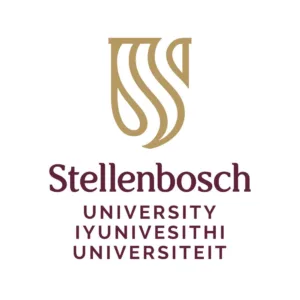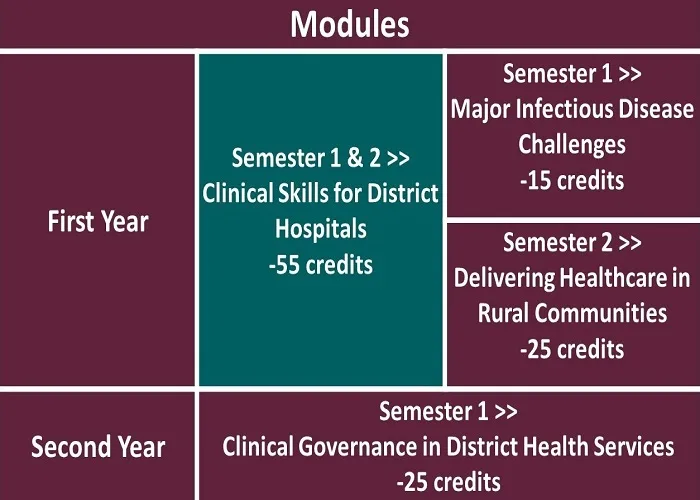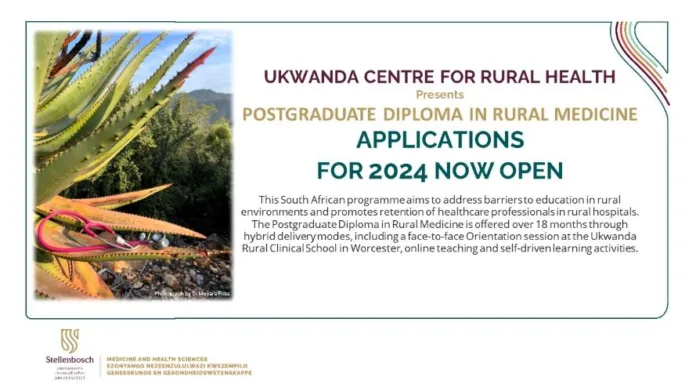

UKWANDA CENTRE FOR RURAL HEALTH
Presents
POSTGRADUATE DIPLOMA IN RURAL MEDICINE
APPLICATIONS
FOR 2024 NOW OPEN
A new groundbreaking programme, the first of its kind in South Africa, addresses the barrier to accessing further education in rural environments by equipping professionals with specialist skills to work in such settings.
Limited postgraduate study opportunities have often resulted in doctors and other healthcare professionals opting to leave rural hospitals.
The programme seeks to equip doctors working or planning to work in rural and remote areas in South Africa.
The Postgraduate Diploma in Rural Medicine runs over 18 months. The mode of delivery is hybrid; this means there will be a face-to-face contact session at the Stellenbosch University Worcester campus (Ukwanda Rural Clinical School) for three days, at the beginning of the first year of study, and thereafter there will be online contact sessions in real-time (synchronous), online self-driven studying (asynchronous) and work integrated learning.
Module 1: Clinical Skills in District Hospitals: requires that students acquire competence is a range of skills relevant to rural hospitals. Students identify and negotiate with potential clinical supervisors to fulfil the requirements.
These clinical skills can be completed at any institution (district hospital, regional hospital etc.) where the student can obtain adequate exposure for the determined procedures. The programme will review and accredit clinical supervisors who meet the requirements. Regular online seminars to provide practical tips in relation to procedures are offered.
Module 2: Major Infectious Diseases Challenges: takes place online and is applied within the clinical setting. The intent is to ensure that students have a comprehensive basic understanding of the major infectious disease challenges they are likely to encounter in a rural district hospital with a focus on HIV/AIDS and TB.
The module covers an overview of the epidemiology and diagnosis of HIV/AIDS and TB, antiretroviral therapy, prevention of-mother-to-child transmission of HIV, management of TB in adults and children, reducing and preventing the burden of TB, and an overview of other common infectious diseases in Africa, with a focus on Southern Africa and on approaches to diagnosis and management. Learning is supplemented by face-to-face case-based seminar discussions.
Modules 3: Delivering Healthcare in Rural Communities: reviews the unique features of healthcare delivery in rural communities, in relation to the concept of rurality and the geographic, social, cultural, and economic context of rural people. Students will learn about the specific needs of rural patients and how to provide them with effective services, considering factors such as access to care, medical referrals, culture, language and local community structures.
The module will also explore the essentials of community health and epidemiology, including the principles of community-oriented primary care. It will include the design of a primary care intervention based on the specific health needs of a local rural community.
Module 4: Clinical Governance in District Health Systems : consists of formal study, supervised application, and reflective practice in relation to effective clinical governance in district health services. Through online learning, students will study the essentials of the structure and management of district health services and core components of clinical governance such as evidence-based care, audit, and quality improvement. Students will develop and implement their own quality improvement project, with receive feedback from their peers and supervisors.
The module will also stimulate the thinking of students on effective leadership and management in the district health setting and how to establish a culture of reflective practice for the rural doctor.


